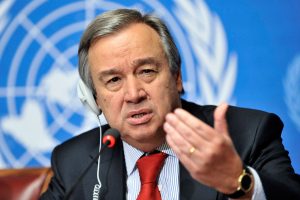Joy Agwunobi

As the world moves toward an era defined by artificial intelligence (AI), the technology’s rapid evolution has triggered a pressing need for global regulations to safeguard humanity’s future. From reshaping industries to transforming warfare, its unprecedented capabilities are outpacing efforts to establish guardrails, raising critical concerns about safety, ethics, and accountability.
At the centre of the debate lies the dual-edged nature of AI. On one hand, its potential to address pressing global challenges such as climate change prediction and its ability to predict humanitarian crises is undeniable. On the other hand, its misuse in military systems and the digital domain poses existential threats, with scenarios involving autonomous weapons, deepfakes, and disinformation looming large. The convergence of AI with advanced technologies like quantum computing adds another layer of complexity, intensifying the risks of destabilised global security.
This evolving landscape has prompted António Guterres, the United Nations Secretary-General, to deliver a warning to ministers and ambassadors at a recent high-level address, emphasising the urgency of global cooperation to ensure AI serves as a tool for progress rather than destruction.
Guterres warned that humanity is falling behind in its ability to regulate AI effectively, a delay that could prove catastrophic. “Every moment of delay in establishing international guardrails increases the risk for us all,” he stated.
He issued a strong appeal against the use of AI in military applications that operate autonomously, stating, “No country should design, develop, deploy or use military applications of AI in armed conflict that violate international humanitarian and human rights laws. That includes relying on AI to select or engage targets autonomously.”
Guterres also pointed to the alarming integration of AI into modern conflicts, where the technology is being tested in areas such as autonomous surveillance, predictive policing, and life-or-death decision-making. This trend, he warned, risks destabilising global peace, especially as advancements in quantum-AI systems potentially intersect with nuclear weapon capabilities.
“The fate of humanity must never be left to the ‘black box’ of an algorithm,” he stressed, calling for strict human oversight in decisions involving the use of force.
Beyond military concerns, Guterres also highlighted AI’s role in manipulating the information domain. He cited the proliferation of deepfakes and AI-generated disinformation, which can erode societal trust, manipulate public opinion, and even provoke crises.
Environmental concerns also featured prominently in his address, as Guterres noted the resource-intensive nature of data centers powering AI systems and the geopolitical competition over minerals essential for AI technologies.
“Unprecedented global challenges call for unprecedented global cooperation,” Guterres said, advocating for inclusive efforts to ensure AI benefits all of humanity rather than exacerbating inequalities.
He further outlined recent international steps to regulate AI, including the adoption of the UN Global Digital Compact and key resolutions at the General Assembly aimed at enhancing global cooperation. A forthcoming resolution addressing the use of AI in the military domain, he noted, will be crucial in shaping the future of AI governance.
Concluding his address, Guterres reiterated his call for a ban on lethal autonomous weapons and urged the Security Council to take the lead in preventing the militarisation of AI in ways that could threaten international stability.
“I urge you all to join forces to build a safe, secure, and inclusive AI future,” he appealed, emphasising the collective responsibility to harness AI for the greater good.







